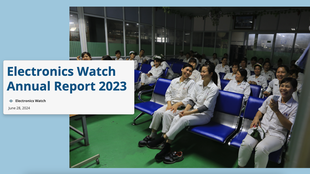
One year after the tragedy at Qisda: Progress and ongoing challenges
In August 2023, Xu Xiao, a 23-year-old migrant worker, was found dead in his dormitory at the Qisda Optronic factory in Suzhou, China. Although his death was not officially classified as work-related, he had worked excessive overtime and consecutive night shifts shortly before his passing. This incident has raised critical questions about working conditions in the electronics industry. Our Impact Story explores what measures have been taken since then, and what challenges still lie ahead.














